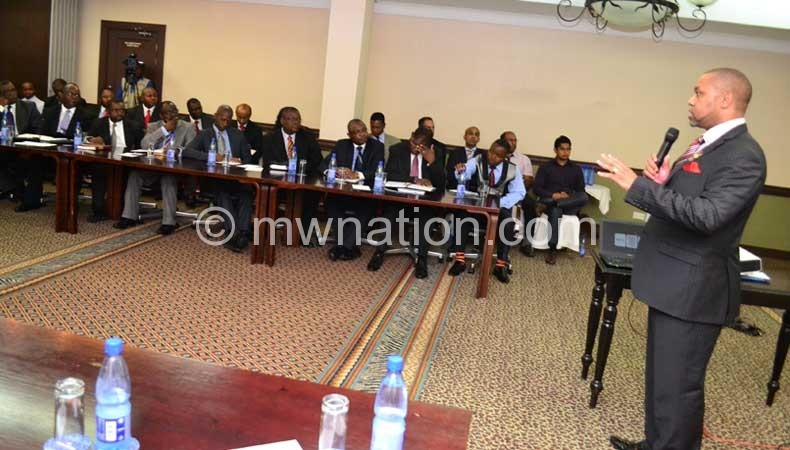Breathing life into public reforms
Since 1964, there have been 79 attempts to reform the public sector in Malawi. The outcomes, however, have been dismal. Why has this been the case and what lessons can Malawi draw from this to inform the implementation of the new reforms being launched today? EPHRAIM NYONDO writes.
He is a marvel in his vast simplicity. He knows most journalists by name—and he has a joke, even bad ones, for each.

He carries his laptop; in fact, he does not even bother anybody from the congress of his aides and advisers to connect his laptop to electric power and projector.
Neither, again, does he confine his world to traditions. Almost everybody that has worked with him—from a cleaner through the captains of the private sector to principal secretaries—knows about his sense of punctuality.
“Initially, some of us found it tough to get used to his ways. In fact, we could joke, saying he can only go so far. But his consistence and the ease with which he does his things have proved that he is a disciplined man. Today, we do not have an option apart from jumping into his boat,” one senior public officer told The Nation recently, off-the-record.
However, you would want to look at him, Vice-President Saulos Chilima embodies a business-unusual approach of running public institutions—one that represents a 180 degrees turn from how Malawians have understood the ways of how government operates.
That is why when President Peter Mutharika appointed him as chairperson of the Public Service Reform Commission (PSRC), even the worst of critics hailed the President for it.
Almost seven months after the Commission was put in place and two months since it submitted its recommendations to the public for input, the launch, today, symbolises a critical step—a breaking point in the long and winding journey of getting the reforms implemented.
Already there are fears. Interestingly, it is Chilima, again, who is the first to confirm public fears regarding the daunting task of getting these reforms on the ground.
“This is not the first time for Malawi Government to push for public service reforms. I would not say that all the reforms that were previously pushed failed. No. Rather, we have not succeeded the way we would have wanted,” Chilima said recently in Blantyre during an interface with the private sector.
He added that Malawi has achieved little in its earlier attempts at reforms and it is justifiable when some expressed reservation with current attempts.
“The challenge, I guess, earlier attempts achieved dismally is perhaps the question of political will. Reforms, elsewhere, work when there is political will by the establishment to push for their implementation,” he said.
He is right.
In an article titled Critical Perspectives on Public Sector Reforms: An Introduction, Chancellor College associate professor of public administration Richard Tambulasi, currently the college’s principal, advances that lack of ownership and commitment of the local political leaders has been a big hurdle to getting reforms implemented.
In fact, the study, done in 2000, reveals that there had been ‘no champion for reform at the political level result[ing] in a rather unfocused and uncoordinated approach to both the formulation and implementation or reform measures’.
However, lack of political will, which leads to the challenge of absence of ownership, is not the only problem which frustrated earlier attempts to reform.
Chancellor College associate professor of public administration Happy Kayuni notes that earlier reforms suffered setbacks because they were externally driven without taking into consideration internal expectations and socio-cultural realities. Most of earlier reforms were driven especially by the World Bank and the International Monetary Fund (IMF).
“The challenge with externally driven reforms is that those pushing for them do not take into account the social, economic and political dynamics of the host nations. They believe there reforms will work just because they worked elsewhere,” he says.
Learning from the reform’s troubled history, Chilima advances that Malawians should not worry about the need for political will in his government.
“The challenge we have now is that there is an overflow of political will to reform not its absence. I guess most Malawians can agree with this,” he said.
In fact, one of the recommendations made by the Commission—which could be interpreted as underlining government political will to reform—is the need not just to strengthen the reforms unit at OPC but also establishment of a ministry which should manage all the reform processes in the country.
The current reforms, which are mostly internally driven and pushed, could thus enjoy the privilege of public ownership and acceptance.
However, Chancellor College professor of public administration Lewis Dzimbiri, warns that reforms are processes that ought to involve all sections of the country, as such, everyone need to be aware to accept and be part of the implementation.
“These are ongoing processes. I guess government will not tire in selling these reforms. What is paramount is the need to roll out a massive civic education programme to ensure that everybody understands these reforms to take part in them,” he says.
He adds that when reforms are being pushed without their overhaul understanding by the people, their survival and success rate is always dismal.





